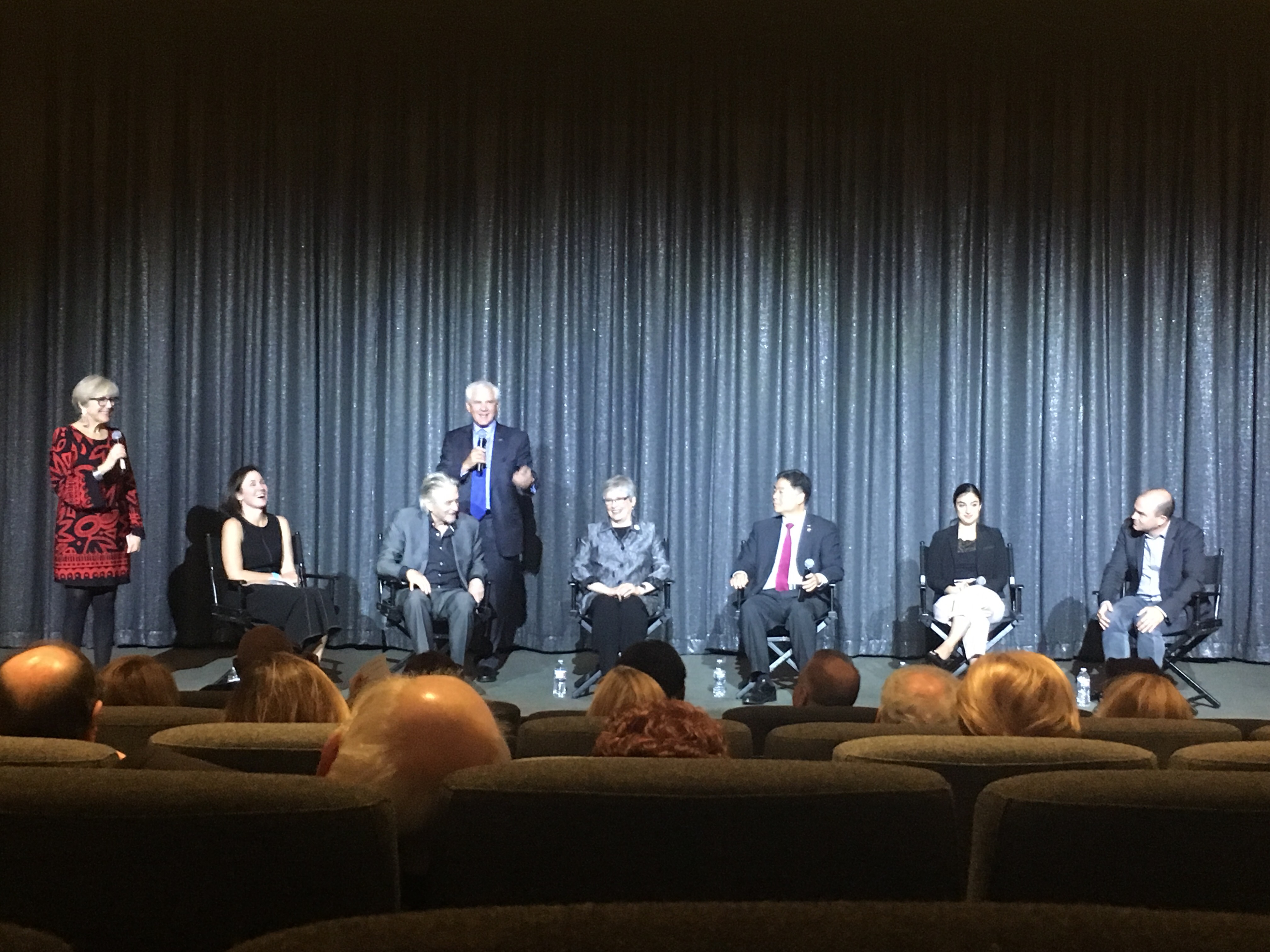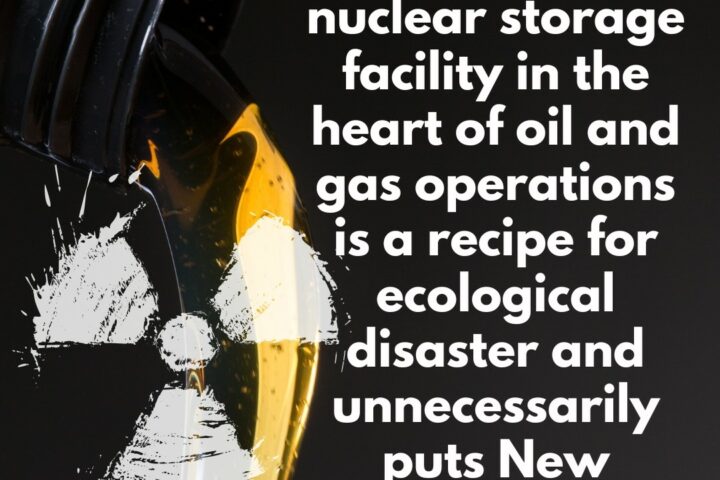
BY SOPHIA STROUD | – NukeWatch NM Web Designer
Monday 3/18 Ploughshares Fund hosted an in-depth discussion about the momentum building for a new, saner nuclear policy and how California can lead the way to a safer, more secure world.
“The more that I dug into the history of nuclear weapons and the legacy that system has today, the more I realized that all the issues I cared about, from gender-based violence, to environmental justice, to climate change, to human rights, to money in politics, is so influenced by the nuclear system. I realized that taking up this mantle now…not only would I be working on issues I’m passionate about and clearing those hurdles that the nuclear system have put up across the board for socialized institutions we care about, but also working on preventing nuclear Armageddon.”
– Yasmeen Silva, Lead organizer for Beyond the Bomb’s #NoFirstUse and other campaigns
The event began with a bang (on screen), with a compilation of well-known scenes from Hollywood movies and television shows that dramatically depict what a nuclear weapons catastrophe would look like. Several writers and producers of some of these scenes were present at the event, including from the shows Manhattan and The West Wing.
Joe Cirincione, president of Ploughshares Fund, lightened the atmosphere by coming on stage to give a brief introduction to the event, speaking about new trends in the activist movement against nuclear weapons and climate change. He emphasized the importance of keeping up the energy and vitality of the women’s march rallies and focusing on the intersectionality of current issues of civil rights, women’s rights, climate change, and nuclear disarmament. Cirincione concluded his introduction by mentioning support and funding for green energy initiatives can come in the form of reappropriated defense spending, “We are on track to spend $2 trillion for the modernization program for new nuclear weapons…you can take a lot of that money and move it over to something a lot more productive.” He then asked the audience to think about participating in one way or another, “whether it’s your talent or your money,” to think about joining in the effort to do something about one of the two greatest threats we face today, nuclear weapons and climate change.
The panel featured:
– Michael Douglas, Award-winning Actor/Producer & UN Messenger for Peace
– Rep. Ted Lieu (D-CA), Co-sponsor Restricting First Use of Nuclear Weapons Act
– Ben Rhodes, Former Deputy National Security Advisor & Co-host of Pod Save the World
– Kennette Benedict, Advisor to Bulletin of Atomic Scientists & Nuclear expert
– Yasmeen Silva, Lead organizer for Beyond the Bomb’s #NoFirstUse and other campaigns
Elizabeth Warner, who moderated the event, started the discussion by asking the panel how they each first became aware of the threat of nuclear weapons and to describe their experience in becoming advocates for the issue.
Yasmeen Silva mentioned her experience working in foreign policy, and spoke to the idea of intersectionality Joe Cirincione mentioned in the introduction:
“The more that I dug into the history of nuclear weapons and the legacy that system has today, the more I realized that all the issues I cared about, from gender-based violence, to environmental justice, to climate change, to human rights, to money in politics, is so influenced by the nuclear system. I realized that taking up this mantle now…not only would I be working on issues I’m passionate about and clearing those hurdles that the nuclear system have put up across the board for socialized institutions we care about, but also working on preventing nuclear Armageddon.”
Elizabeth Warner asked Kennette Benedict about major debates around secrecy in the field, and how much goes on behind closes doors.
Kennette Bendict: “Democracy and a bomb are incompatible – as citizens how can we participate in these decisions about our security and nuclear weapons that will inevitably impact each and every one of us? Democracy requires political participation – it demands that we vote, assumes we are equal, that we have influence over policy, and that we get information that we can use to make decisions and choose among candidates. When it comes to nuclear weapons, one person has the sole authority to launch those weapons, destroy another society and put us at enormous risk. In a sense we live in a thermonuclear monarchy.
The secrecy that surrounds nuclear weapons is quite extraordinary and it is really the only policy area where we have so much secrecy – the current administration does not publish how many nuclear weapons we have, what the war plans are, what the consequences of those might be. So we’re really in the dark – the government has decided what we can and can’t know about the most consequential decision a country can make – whether to go to war, and whether to go to nuclear war. We think we have a democracy, but we will not have a full democracy until as citizens we can take greater control of this extraordinarily dangerous technology.
We need to demand information, we need to demand the veil of secrecy be drawn away from the nuclear weapons, we need to have info we need to have debates about nuclear weapons in every single presidential race, every governors race, every state legislators race, every mayoral race – congress now looks like they are interested in taking some control over this issue and that’s a tremendous step forwards, so that we begin to regularize our discussions about nuclear policy and move toward what you might call nuclear democracy. I’m hopeful about this moment but I think its important to understand that all of us need to participate.
A common disclosure when Kennet Benedict is asked a question: ‘I’m not an expert on nuclear weapons but..”
Her response? “We are all experts on nuclear weapons – because we are all going to be affected by those nuclear weapons we have a lot at stake – each and every one of us, so it behooves us to learn as much as we can, and demand that the government give up its secrets.”
Yasmeen:
Since I joined the nuclear space about 2 years ago there is such a heightened understanding of this issue – maybe not the wonkiness, maybe not what different yields mean, but that this issue is real, it isn’t that intangible – what can people do? Plug in – call or write an email, reach out to you representative and Beyond the Bomb!
Elizabeth Warner asked Michael Douglas: What role do you think Hollywood can play in this effort?
MD: “Entertain us hopefully. And make it a strong visual issue, because sensory impact can be so powerful – this issue, beside the complexity, always comes down to “well there’s nothing I can do as a citizen this is governments job” – this has to become a rallying cry for the next election.”
Ben Rhodes – sometimes people get apathetic or cynical about their capacity to bring about change. That’s exactly what the Trumps and the Coke brothers of the world want – they’re counting on apathy and cynicism – that’s a recipe for them winning. If we can mobilize on our side then I’m more than confident that we can make this pendulum swing back much harder than they did before.
But it is going to take everybody playing a role – its going to take citizens playing a role, member of congress playing a role, people in foreign policy playing a role, people in the entertainment industry who are the portal through which Americans hear the stories about themselves and the world they live in – it’s going to take all of us playing a role, and if we do it I’m very confident we’ll be sitting here in a few years having an entirely different conversation.
Sam Shaw: Writer/Producer The Manhattan Project
I found that when you start to research the security state and issues of national secrecy, all roads lead to New Mexico. And more and more it came to feel like this story of the Manhattan project was sort of this great origin story of the American superpower heyday and a story that explained a lot of challenges that were still trying to reckon with now, from this trade off between freedom and security, to the political sides of science. It was also kind of the birth of the suburbs because Los Alamos came to become kind of a template for Levittown, so that idea that the apocalypse and the cold war American suburb were twins of the same womb – what could be more fascinating than that? That was the genesis, it was kind of an accident that the issues around nuclear weapons and nonproliferation, which I came to care abut a great deal, were the air that we got to breathe writing the show for years.
The show is sort of a moral thriller about people grappling with really complicated moral questions, but to the extent that it was possible to try to make a conversation that is usually very abstract and obtuse, not accidentally some of the codes and scriptures and secrecy that were part of the construction of the Manhattan project have been metabolized by the country and they account for the fact that we still don’t really know how to talk about these issues and there is a real learning curve where a lot of people feel they’re not informed in the way they need to be to participate tin the conversation.”

